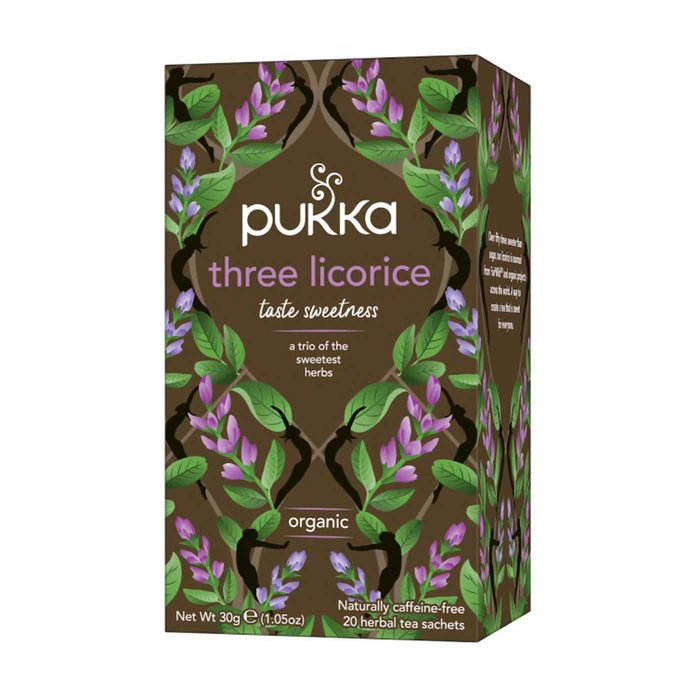Do your teabags contain plastic?
Tea companies have recently come under scrutiny for the use of polypropylene, a plastic used to heat-seal the edges of teabags. Pukka doesn’t use this kind of material. Instead, we use a simple stitch of organic cotton and a unique folding process. This means we don’t need to use polypropylene to hold our teabags together. We were the first company to ever use organic strings to hold our teabags together without the need of a metal staple or polypropylene.
Why are Pukka teabags wrapped in individual sachets?
We wrap our organic herbal blends in an envelope because we want to lock in the freshness and protect the high essential oil content which gives our teas such a special taste. Individually wrapped envelopes protect the tea bags from light and moisture which degrade the herbs, causing the tea to lose its depth of flavour and herbal health benefits. The envelope also prevents any cross-contamination of flavour or smell with other nearby foods.
Can I drink Pukka teas that contain licorice in if I have high blood pressure?
We love licorice at Pukka. Sweetness is just one of the six essential tastes that our Herbsmith Sebastian Pole considers when creating our blends, carefully balancing the therapeutic effect of our teas with the best taste experience. It is calming and nourishing, and its silky nature helps soothe your whole system. In many traditional medicine approaches around the world it is also seen as a good harmoniser of other herbs in a mix. Adding licorice to our teas brings out the best of all ingredients so you get the most balanced blend.
Some studies into the effects of licorice on our bodies have suggested that it has the potential to increase blood pressure and decrease blood potassium levels. These studies have used either isolated extracts of a constituent known as glycyrrhizin (GL) or licorice candy sweets, and the implications for taking licorice in its natural form, e.g. in teas, have not been established. For example, in licorice candy, high levels of sugar and salt may also affect blood pressure or potassium levels. Studies on the risks of licorice candy have also been done in countries where recreational consumption is more common.
Most Pukka teas have levels of licorice that are too low to have an impact on blood pressure unless taken excessively. However, there are a few where levels are higher and here we should take due precautions. If you have moderate or severe hypertension (high blood pressure) you should monitor your readings if you are taking regular daily quantities of Pukka teas that have high levels of licorice. The teas with the most have the word ‘Licorice’ in the title of the tea: Three Licorice, Peppermint and Licorice, and Licorice and Cinnamon (for which we put a high blood pressure warning on the labels). Other relatively high licorice levels are seen in Mint Refresh and Lemon, Ginger and Manuka.
On balance it is probably wise not to consume any high-licorice tea every day if you have high blood pressure. However, it is regularity and frequency that makes the difference and you should be able to enjoy occasional cups of all these teas safely.
Is the amount of Licorice in Pukka teas safe to drink during pregnancy?
As the previous FAQ outlines, there is a potential risk with taking large quantities of licorice in the case of high blood pressure. Blood pressure can also occasionally rise significantly in pregnancy and, if this has been confirmed for you, you will probably be closely monitored and will justifiably be extra cautious about any additional risk and understandably give licorice a temporary break.
Actually, there is no evidence of general risks to pregnancy with moderate intakes of licorice. In the more excessive case, a sequence of studies by a research group in Finland has indicated that heavy consumption of licorice candy by pregnant mothers (high consumption is more common in that country) has minor effects on birth timings and may even have limited consequences for subsequent childhood development. However, these findings relate to sugar- and salt-rich candy consumption, and to daily ‘heavy’ (more than 500 mg glycyrrhizin/week) consumption over many weeks. Neither have these findings been confirmed in any other country. All other evidence points to moderate licorice consumption being safe, and regulatory authorities in Europe, the USA and Australia do not warn against its use in pregnancy. Nor do we.
Here at Pukka however we have your welfare close to our hearts so to take the worst-case scenario from the Finnish study we suggest that if you are pregnant you have less than 3 cups per day of Cinnamon and Licorice and Licorice and Peppermint and no more than 1 cup of Three Licorice tea per day.

